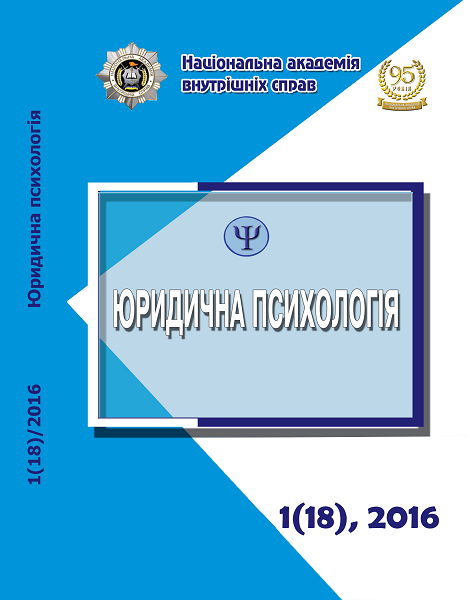Professional Communication of Patrol Officer with Various Categories of Citizens
Keywords:
patrol police officer, communicative strategy, speech sphere duties, job responsibilities
Abstract
The article highlights the key rules of the communicative strategies of patrol policeman. The basic provisions are based on the behavior of patrol officer scope, of verbal behavior during operating of his official duties. In the process of reforming of law enforcement agencies we could see the rise of the value of patrol police officer professional competence, namely the culture of their professional communication. Cultural mutual relationship of patrol police officer includes politeness, correctness, accuracy and tact. Patrol officer speech culture serves as an indicator of his training, compliance or noncompliance with the position, and in general the ability to work with people. Subject of patrol police determines the rules of communication in the professional activity is one of the most important in police patrol training. It consists of two components: a communication culture within the service staff and norms of policemen communication with the public in different situations. The article analyzes the patrol police officers performing of professional cultural etiquette rules. Currently, work is carried out to form a new positive image of police, to improve their professional skills and readiness for professional dialogue. The effectiveness of patrol police tasks depends on the specific knowledge and patterns of professional communication, the ability to establish psychological contact and to receive important information about the imminent crimes. Communicative component of law enforcement activities is the most actual for most branches of law enforcement activities. The patrol police officers has to master speech to qualified dialogue (which is to lead, not to take part in it), feel confident in different communicative situations. Patrol policeman must be able to establish psychological contact with any citizen. An integral part of law enforcement professional communication with people is some formalization of such communication by various legal documents (statutes, orders, etc.). The purpose and the final result of communication training of patrol police are forming by them the communicative readiness professionally competently, efficiently, accurately, clearly with a high capacity for work to perform professional function with communicative component in any difficult conditions of service that carried out through the formation and development of professionally important qualities, knowledge, skills and abilities. Law enforcement activities puts high demands to the communication skills of patrol police officers, in the first place to professionally important. Accordingly, the main training tasks are to form the above qualities, to provide conditions for further professional self-development through professional psychological knowledge, skills and abilities.Downloads
Download data is not yet available.
Abstract views: 439 PDF Downloads: 1062
Issue
Section
Psychological support of law enforcement
- Authors reserve the right to authorship of their own work and transfer to the magazine the right of the first publication of this work under the terms of the Creative Commons Attribution License, which allows other persons to freely distribute published work with mandatory reference to authors of the original work and the first publication of an article in this magazine.
- Authors have the right to enter into separate additional agreements on non-exclusive dissemination of the work in the form in which it was published in the journal (for example, to post an article in the institution's repository or to publish as part of a monograph), provided that the link to the first publication of the work in this journal is maintained.
- The journal's policy allows and encourages the posting of articles by authors on the Internet (for example, in electronic storehouses of institutions or on personal websites), both before the submission of this manuscript to the editorial office and during its editorial processing, as this contributes to the creation of a productive scientific discussion and positively affects the efficiency and dynamics of citing the published work.




